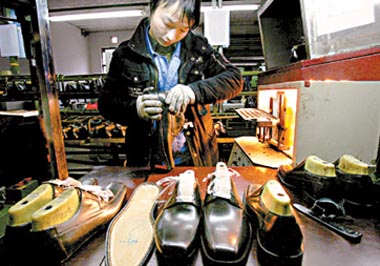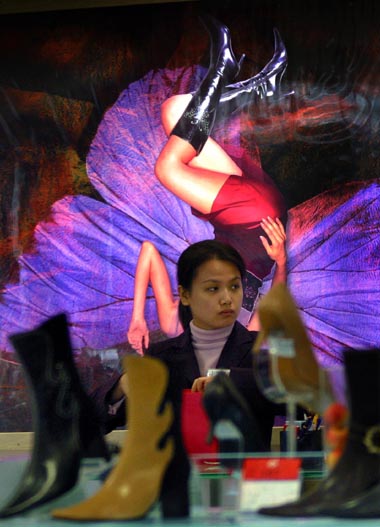|
Shoe makers prepare to battle EU
By Jiang Wei (China Daily)
Updated: 2006-03-07 06:14
Chinese shoe manufacturers are preparing for a final battle against the
European Union (EU) dumping charges before a primary ruling on punishment is
made, in a bid to win favourable tariff rates.
Wu Zhenchang, board chairman with Chuangxin Footwear in Guangdong Province,
said his firm was contacting other enterprises and collecting information to try
and prove they are not harming EU businesses.

Facts and
figures:
* The European Union implemented a licensing and inspection
mechanism on China's shoes exports beginning in February, 2005.
* It
launched investigations into the dumping of safety shoes and leather shoes
imported from China last June and July respectively.
* Last month the
EU trade chief proposed penalty duties of up to almost 20 per cent being
phased in on Chinese footwear.
| The company,
with seven other shoe makers, last month set up a coalition to counteract the
charges of dumping from the EU.
The coalition has the support of around 130 domestic shoemakers.
Wu said they would also urge the European Commission to re-consider giving
market economy treatment to Chinese shoemakers during a visit to China by an EU
delegation.
The delegation will be here on Friday to discuss issues concerning dumping,
according to a source closely watching the situation.

A salesgirl waits for customers at a
department store in Nanjing, East China's Jiangsu Province, in this
January 12, 2006 file
photo.[newsphoto]
| The EU delegation is
scheduled to meet Chinese enterprises in Hangzhou in East China's Zhejiang
Province, and will come to Beijing for talks with the Ministry of Commerce and
industrial associations on Sunday.
Meanwhile, enterprises are also being urged to argue against the substitute
country issue. Since China is not recognized as a market economy, the EU has
chosen a third country in this shoemaking case, Brazil to compare Chinese
companies' prices.
"It is unreasonable to take Brazil as a substitute country as the industrial
structure is quite different and production costs are much higher in the
country," said Su Chaoying, deputy director with China Leather Association. He
added that he recommended Indonesia as the substitute country, as costs there
are lower.
Wu expected that the shoemakers' coalition could minimize the penalty duties
for some Chinese firms.
Last month EU Trade Commissioner Peter Mandelson recommended phasing in 19.4
per cent anti-dumping duties on Chinese shoes and 16.8 per cent on Vietnamese
footwear, over a six-month period.
"There is compelling evidence of serious state intervention on a large and
strategic industrial scale," Mandelson told European media. "This
state-supported dumping is causing serious injury to European industry."
His proposal is scheduled to be discussed at the Anti-dumping Committee
meeting on Thursday.
If approved by a majority, the temporary tariffs will start at 4 per cent in
April and increase to the highest levels over six months. Children's shoes and
high-tech sports shoes will be exempted.
Before coming up with the tariff proposal, the European Commission declined
to give market economy treatment to 13 Chinese leather shoemakers that were
investigated last autumn for dumping.
Fu Donghui, a senior legal expert with Allbright Law Office in Beijing, said
the EU gave market economy treatment to several Chinese firms (not the shoe
sector) involved in other cases of dumping after 1997.
"We cannot believe that no company was given the treatment in this shoemaking
case, since the footwear industry is one of the highest market-oriented sectors
in China," he said. "Now we see the EU going backwards with dumping charges," he
added.
Possible duties on Chinese footwear would be a big blow for Chinese players,
as the EU is the second largest export market for Chinese enterprises.
The dumping charge has also been condemned by some EU and US footwear giants
which operate plants in China, for they are likely to shoulder higher costs.
It would also mean European consumers paying more for their shoes. If shoe
export prices increase by US$1 per pair, EU consumers would pay around US$1
billion more for footwear every year.
(China Daily 03/07/2006 page9)
|